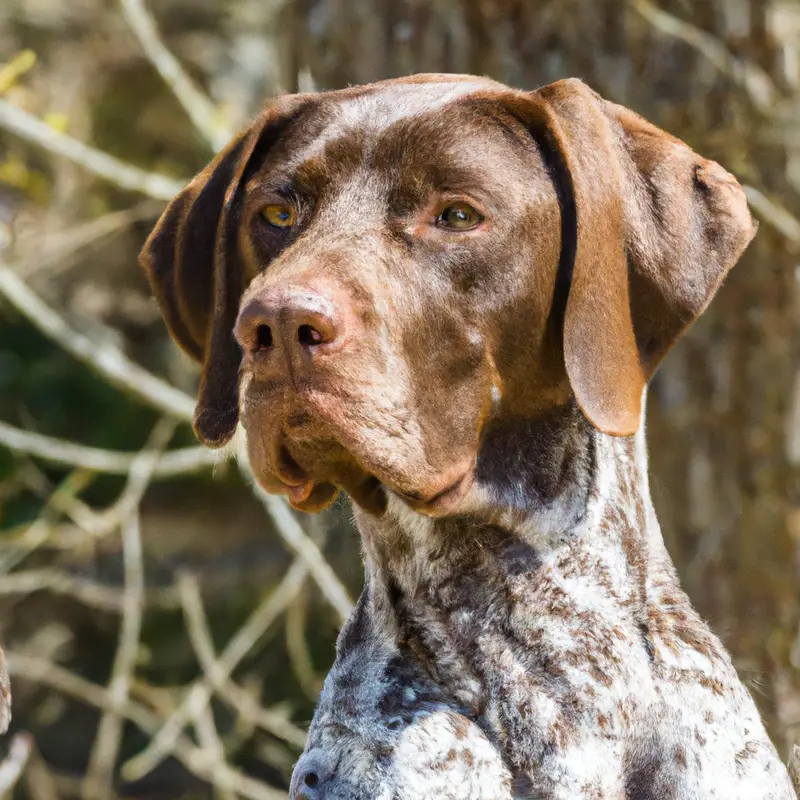What Type Of Diet Is Best For My German Shorthaired Pointer?
Key Takeaways:
- Balanced and high-quality dog food is crucial for maintaining the health and wellbeing of your German Shorthaired Pointer.
- Consider the specific needs of your dog, such as age, activity level, and any health conditions, when selecting the right diet.
- A diet rich in lean protein, healthy fats, and essential nutrients, supplemented with occasional fresh fruits and vegetables, is ideal for your German Shorthaired Pointer.
- Regular monitoring of your dog’s weight and overall condition, along with consultation with a veterinarian, will help ensure that you are providing the best diet for your German Shorthaired Pointer.
Are you a German Shorthaired Pointer parent, eager to ensure your furry friend is thriving on the best diet? Well, you’ve come to the right place! As an expert in canine nutrition, I’m here to shed light on the topic and guide you in making informed decisions about your pup’s food.
German Shorthaired Pointers have unique nutritional needs that play a crucial role in their overall health and well-being.
In this blog article, we’ll explore the importance of a proper diet, the different dietary options available, essential nutrients, feeding guidelines, special considerations, and tips for maintaining a healthy diet. So let’s dive in and discover the pathway to a healthy and happy German Shorthaired Pointer!
| Type of Diet | Description |
| Raw Diet | A diet that consists of raw meat, bones, fruits, and vegetables. It aims to mimic a dog’s natural diet in the wild. |
| Commercial Kibble | A dry, commercially prepared food that is formulated to meet the nutritional needs of dogs. It often contains a mixture of meat, grains, and vegetables. |
| Home-cooked Diet | A diet that is prepared at home using ingredients such as lean meats, grains, and vegetables. It allows for more control over the ingredients and can be tailored to a dog’s specific needs. |
| Hybrid Diet | A combination of both raw and commercial kibble or home-cooked food. It provides the benefits of both types of diets and offers more variety to a dog’s meals. |
Understanding the nutritional needs of German Shorthaired Pointers
The importance of a proper diet for German Shorthaired Pointers
A proper diet is crucial for the overall health and well-being of German Shorthaired Pointers. Providing them with the right nutrients in the right amounts ensures they have the energy they need to stay active and maintain a healthy weight.
A balanced diet is also essential for their coat and skin health, as well as for supporting their immune system and preventing certain health issues.
By feeding your German Shorthaired Pointer a nutritious diet that meets their specific needs, you can help them live a long and healthy life.

Common health issues in German Shorthaired Pointers related to diet
German Shorthaired Pointers are generally healthy dogs, but they can be prone to a few common health issues related to their diet. These issues include:
- Food Allergies: Some German Shorthaired Pointers may develop allergies to certain ingredients in their food, such as grains, chicken, or beef. It is important to identify the allergen and switch to a suitable hypoallergenic diet.
- Obesity: This breed loves to eat and can easily become overweight if their food intake is not monitored. Obesity can lead to numerous health problems, including joint issues, heart disease, and diabetes. Feeding them a balanced and portion-controlled diet is crucial to maintain a healthy weight.
- Gastric Dilatation-Volvulus (GDV: Also known as bloat, GDV is a life-threatening condition that can be triggered by eating too quickly or overeating. To reduce the risk, feed your German Shorthaired Pointer smaller, more frequent meals instead of large meals, and avoid exercise immediately after eating.
- Pancreatitis: This is an inflammation of the pancreas, which can be caused by a high-fat diet or the consumption of fatty foods. To prevent pancreatitis, it is important to feed your dog a low-fat and easily digestible diet.
By being aware of these common health issues and providing a balanced, appropriate diet, you can help keep your German Shorthaired Pointer happy and healthy. Remember to consult with your veterinarian for specific dietary recommendations based on your dog’s individual needs.

Nutritional requirements for German Shorthaired Pointers at different life stages
German Shorthaired Pointers have specific nutritional requirements at different life stages to keep them healthy and thriving. Here’s what you need to know:
- Puppy Stage:
- During the first year, puppies need a balanced diet that supports their rapid growth and development.
- Feed them high-quality puppy food specifically formulated for large breeds to ensure proper bone and muscle growth.
- Make sure the food contains essential nutrients like protein, calcium, and DHA for brain development.
- Adult Stage:
- Adult German Shorthaired Pointers have different nutritional needs compared to puppies.
- Provide them with a well-balanced diet that includes lean protein, complex carbohydrates, healthy fats, and essential vitamins and minerals.
- Monitor their weight to avoid obesity, as this breed is prone to weight gain.
- Consult with your veterinarian for specific feeding guidelines based on your dog’s size, activity level, and health condition.
- Senior Stage:
- As German Shorthaired Pointers age, they may experience reduced activity levels and changes in metabolism.
- Adjust their diet to meet their lower energy requirements and support joint health.
- Senior dog food formulas often contain lower calories, increased fiber, and joint-supporting nutrients like glucosamine and chondroitin.
- Regularly check with your vet to determine if any adjustments or supplements are necessary.
Remember, every dog is unique and may have individual dietary needs. Consulting with a veterinarian is always recommended to ensure your German Shorthaired Pointer gets the proper nutrition for their specific life stage.

Choosing the right diet for your German Shorthaired Pointer
The benefits of commercial dog food for German Shorthaired Pointers
Commercial dog food offers several benefits for German Shorthaired Pointers. Firstly, it is specifically formulated to meet their nutritional needs, ensuring they receive a balanced diet.
Secondly, commercial dog food undergoes rigorous testing to ensure safety and quality.
This means that it is less likely to contain harmful ingredients or contaminants. Additionally, commercial dog food often includes added vitamins, minerals, and supplements that support the overall health and well-being of German Shorthaired Pointers.
Lastly, it is convenient and easy to feed, saving you time and effort in meal preparation.
Homemade diets for German Shorthaired Pointers: Pros and cons
Homemade diets for German Shorthaired Pointers can have both pros and cons. Here are a few points to consider: Pros:
- Control over ingredients: With a homemade diet, you have complete control over what goes into your dog’s food, allowing you to customize it based on their specific needs and preferences.
- Fresh and natural ingredients: By preparing meals at home, you can ensure that your German Shorthaired Pointer gets fresh and natural ingredients, which can be beneficial for their overall health.
- Potential cost savings: In some cases, homemade diets can be more cost-effective compared to commercial dog food, especially if you buy ingredients in bulk or utilize leftovers.
Cons:
- Nutritional balance: It can be challenging to create a well-balanced diet that meets all of your dog’s nutritional requirements. Ensuring they receive the right amounts of protein, carbohydrates, fats, vitamins, and minerals can be tricky.
- Time-consuming: Preparing homemade meals for your German Shorthaired Pointer can be time-consuming, as it involves planning, shopping, cooking, and portioning. It requires consistent effort and dedication.
- Risk of nutrient deficiencies or excesses: Without proper knowledge and guidance, there is a risk of unintentionally creating nutrient deficiencies or excesses in your dog’s diet, which could lead to health problems.
Remember, before switching to a homemade diet, it’s crucial to consult with a veterinarian or a professional animal nutritionist to ensure you are providing your German Shorthaired Pointer with a balanced and nutritious meal plan.
Transitioning your German Shorthaired Pointer to a new diet
Transitioning your German Shorthaired Pointer to a new diet doesn’t have to be a daunting task. Here are some tips to make the process smooth and successful:
- Gradual transition: Start by mixing a small amount of the new diet with your dog’s current food. Gradually increase the proportion of the new food over a period of 7-10 days. This helps prevent digestive upset.
- Monitor your dog’s reaction: Keep an eye on your German Shorthaired Pointer during the transition. Look for any signs of discomfort or digestive issues such as diarrhea or vomiting. If you notice any problems, slow down the transition or consult your vet.
- Stay consistent: Once your dog has fully transitioned to the new diet, it’s important to stick with it. Consistency is key for maintaining your dog’s digestive health and overall well-being.
Remember to consult with your vet before making any significant changes to your dog’s diet. They can provide personalized guidance based on your dog’s individual needs and health conditions.
Essential nutrients for German Shorthaired Pointers
The role of protein in a German Shorthaired Pointer’s diet
Protein plays a vital role in a German Shorthaired Pointer’s diet. It is an essential nutrient that helps support the growth, maintenance, and repair of tissues in their body.
Protein is particularly important for their strong muscles, as well as their skin, coat, and immune system.
It provides the necessary amino acids that their body needs to function properly. Including lean sources of protein, such as chicken, fish, and turkey, in their diet is crucial for keeping them healthy and energetic.
Remember to consult with a veterinarian to determine the specific protein requirements for your German Shorthaired Pointer.
The importance of carbohydrates and fats for German Shorthaired Pointers
Carbohydrates and fats play a crucial role in the diet of German Shorthaired Pointers. Here’s why they are important for your furry friend:
- Energy source: Carbohydrates are a primary source of energy for dogs. They provide the fuel that keeps your German Shorthaired Pointer active and playful throughout the day.
- Muscle health: Fats are essential for muscle development and maintenance. They help provide long-lasting energy and contribute to the overall strength and agility of your dog.
- Nutrient absorption: Certain vitamins, like Vitamin A, D, E, and K, are fat-soluble, which means they need fats for proper absorption. Including healthy fats in your dog’s diet ensures they can absorb these vital nutrients efficiently.
- Healthy skin and coat: Fats, particularly omega-3 and omega-6 fatty acids, are beneficial for maintaining healthy skin and a shiny coat. They help reduce inflammation, prevent dryness, and promote a lustrous appearance.
Remember, balance is key. Consult your veterinarian to determine the appropriate amount of carbohydrates and fats to include in your German Shorthaired Pointer’s diet for optimal health and well-being.
Understanding the role of vitamins and minerals in your dog’s diet
Vitamins and minerals play a vital role in your dog’s diet. They are essential for maintaining good health and overall well-being.
These nutrients are responsible for various functions in the body, such as supporting the immune system, promoting healthy bones and teeth, aiding in digestion, and ensuring proper growth and development.
Without an adequate supply of vitamins and minerals, your dog may experience health issues and deficiencies. It is important to provide a balanced diet that includes a wide range of nutrient-rich foods to ensure your dog gets all the necessary vitamins and minerals.
Feeding guidelines for German Shorthaired Pointers
Determining the right portion sizes for your German Shorthaired Pointer
Determining the right portion sizes for your German Shorthaired Pointer is important for maintaining their overall health and weight. Here are a few tips to help you find the right balance:
- Start with the recommended guidelines: Begin by following the feeding guidelines provided by the dog food manufacturer. These guidelines are typically based on your dog’s weight and activity level.
- Monitor your dog’s body condition: Regularly assess your German Shorthaired Pointer’s body condition to ensure they are not too thin or overweight. Ideally, you should be able to feel their ribs without excessive fat cover.
- Adjust portion sizes as needed: If your dog is gaining weight, reduce their portion size. Conversely, if they are losing weight or appear too thin, increase the amount you are feeding them.
- Consider activity level: Take into account your dog’s activity level when determining portion sizes. More active dogs may require slightly larger portions to fuel their energy needs.
- Be mindful of treats: Remember to factor in any treats or snacks given during the day when calculating your dog’s overall portion size. These additional calories can quickly add up.
- Consult with your veterinarian: If you’re unsure about the right portion sizes for your German Shorthaired Pointer, consult with your veterinarian. They can provide specific recommendations based on your dog’s unique needs.
By keeping an eye on your German Shorthaired Pointer’s body condition and adjusting portion sizes accordingly, you can ensure they maintain a healthy weight and overall well-being.
How often should you feed your German Shorthaired Pointer?
Feeding frequency is an important consideration for your German Shorthaired Pointer. It is generally recommended to feed them twice a day, once in the morning and once in the evening.
This regular feeding pattern helps maintain their energy levels and prevents hunger between meals.
Keep in mind that every dog is unique, so you may need to adjust the portion size or feeding frequency based on your individual dog’s needs. Additionally, make sure to provide fresh water throughout the day to keep your German Shorthaired Pointer hydrated.
Tips for managing weight and preventing obesity in German Shorthaired Pointers
Managing weight and preventing obesity is crucial for the health and well-being of German Shorthaired Pointers. Here are some tips to help you keep your furry friend at a healthy weight:
- Portion control: Measure your dog’s food and avoid overfeeding. Follow the recommended serving sizes based on your dog’s age, size, and activity level.
- Avoid free-feeding: Instead of leaving food out all day, establish regular meal times. This will help prevent your dog from constantly snacking and consuming excess calories.
- Provide a balanced diet: Feed your German Shorthaired Pointer a high-quality, balanced diet that meets their nutritional needs. Consult your veterinarian for specific dietary recommendations.
- Limit treats: While treats can be a fun way to reward your dog, too many can contribute to weight gain. Choose healthy, low-calorie treats and limit their intake.
- Regular exercise: Ensure your dog gets regular exercise to burn calories and maintain a healthy weight. Engage in activities such as walks, runs, and playtime.
- Monitor weight: Keep an eye on your dog’s weight by regularly weighing them and checking their body condition score. If you notice weight gain, adjust their diet and exercise routine accordingly.
Remember, maintaining a healthy weight is essential for your German Shorthaired Pointer’s overall health and longevity.
Special dietary considerations for German Shorthaired Pointers
Food allergies and sensitivities in German Shorthaired Pointers
German Shorthaired Pointers may develop food allergies and sensitivities, just like any other dog breed. Common food allergens include poultry, beef, dairy products, wheat, and soy.
If your GSP shows symptoms like itching, gastrointestinal issues, or skin problems, it may be due to a food allergy or sensitivity.
Identifying and eliminating the problem ingredient from their diet is key. Consult with your veterinarian to conduct food trials or recommend hypoallergenic diets.
Remember, every dog is unique, so it’s essential to observe your GSP’s reactions to different foods and make adjustments accordingly.
The role of supplements in a German Shorthaired Pointer’s diet
Supplements can play a beneficial role in a German Shorthaired Pointer’s diet. They can provide additional nutrients and support their overall health and well-being.
Some common supplements for dogs include omega-3 fatty acids for a healthy coat and joints, probiotics for digestive health, and glucosamine for joint health.
However, it’s important to consult with your veterinarian before adding any supplements to your dog’s diet. They can guide you on the appropriate dosage and ensure that the supplements are safe and appropriate for your German Shorthaired Pointer.
Dealing with dietary restrictions or medical conditions in German Shorthaired Pointers
If your German Shorthaired Pointer has dietary restrictions or medical conditions, it’s important to address these issues with their diet. Here are some tips:
- Consult with your veterinarian: They can provide guidance on the specific dietary needs of your dog based on their condition.
- Allergies or sensitivities: If your dog has allergies or sensitivities, avoid ingredients that trigger these reactions, such as certain proteins or grains.
- Digestive issues: For dogs with sensitive stomachs or digestive issues, consider a diet that is easily digestible, such as a limited ingredient or grain-free formula.
- Weight management: If your dog needs to lose or gain weight, work with your vet to develop a feeding plan that meets their nutritional needs while achieving the desired weight.
- Medical conditions: Certain medical conditions, such as kidney disease or diabetes, may require specialized diets. Follow your vet’s recommendations for these conditions.
Remember, it’s crucial to regularly monitor your dog’s health and make any necessary adjustments to their diet under the guidance of a veterinarian.
Tips for maintaining a healthy diet for your German Shorthaired Pointer
Importance of regular veterinary check-ups and nutrition consultations
Regular veterinary check-ups and nutrition consultations are crucial for the overall health and well-being of your German Shorthaired Pointer. These check-ups allow veterinarians to monitor your dog’s health and catch any potential problems early on.
During these visits, the vet will assess your dog’s weight, body condition, and dental health, and provide guidance on a balanced and nutritious diet tailored to your dog’s specific needs.
They can also address any concerns or questions you may have about your dog’s diet or nutritional requirements. By scheduling regular check-ups and nutrition consultations, you can ensure that your German Shorthaired Pointer maintains optimal health and lives a long and happy life.
Incorporating exercise and mental stimulation into your German Shorthaired Pointer’s routine
Incorporating exercise and mental stimulation into your German Shorthaired Pointer’s routine is essential for their health and happiness. Here are some tips to keep them active and engaged:
- Daily walks: Take your German Shorthaired Pointer for regular walks to ensure they get the exercise they need. Aim for at least 30 minutes to an hour of brisk walking or jogging.
- Engage in interactive play: Play games like fetch or hide-and-seek with your dog. This not only provides physical exercise but also stimulates their mind.
- Dog sports and activities: Consider enrolling your German Shorthaired Pointer in agility training or other dog sports. This can provide both mental and physical stimulation while strengthening the bond between you and your pet.
- Puzzle toys and treat dispensers: Use interactive toys that require your dog to think and problem solve. This can help keep their mind active and prevent boredom.
- Training sessions: Incorporate short training sessions into your dog’s routine. This not only helps with obedience but also provides mental stimulation.
Remember, every dog is unique, so it’s important to tailor their exercise and mental stimulation routine to their individual needs. With regular physical activity and mental engagement, your German Shorthaired Pointer will lead a happy and fulfilling life.
Signs of a balanced and nutritious diet in German Shorthaired Pointers
A balanced and nutritious diet for your German Shorthaired Pointer shows in their overall health and well-being. Here are some signs that indicate your dog is receiving the right diet:
- Shiny coat: A healthy diet will make your dog’s coat soft, shiny, and free from dryness or flakiness.
- Ideal weight: Your dog should maintain a stable weight, neither underweight nor overweight. A balanced diet helps them maintain a healthy body condition.
- Energy level: A well-fed dog will have good energy levels. They will be active, alert, and ready for exercise and play.
- Strong muscles and bones: Proper nutrition contributes to strong muscles and bones, which are essential for your dog’s overall strength and agility.
- Dental health: A balanced diet keeps your dog’s teeth and gums healthy. Their breath should not have a foul odor, and their teeth should be clean and strong.
Remember, every dog is unique, and their dietary needs can vary. It’s always a good idea to consult with your veterinarian to ensure you’re providing the right diet for your German Shorthaired Pointer.
Final Verdict
Understanding the nutritional needs of your German Shorthaired Pointer is crucial for their overall health and well-being. By providing a proper diet, you can prevent common health issues and support their different life stages.
While commercial dog food offers convenience and balanced nutrition, homemade diets can be tailored to your dog’s unique needs.
Remember to transition your dog gradually to new diets and ensure they receive essential nutrients like protein, carbohydrates, fats, vitamins, and minerals. Following feeding guidelines and managing weight can prevent obesity.
Consider special dietary considerations and consult with your veterinarian for personalized advice.
By prioritizing your German Shorthaired Pointer’s diet and making informed choices, you can ensure a long and healthy life for your beloved companion.







